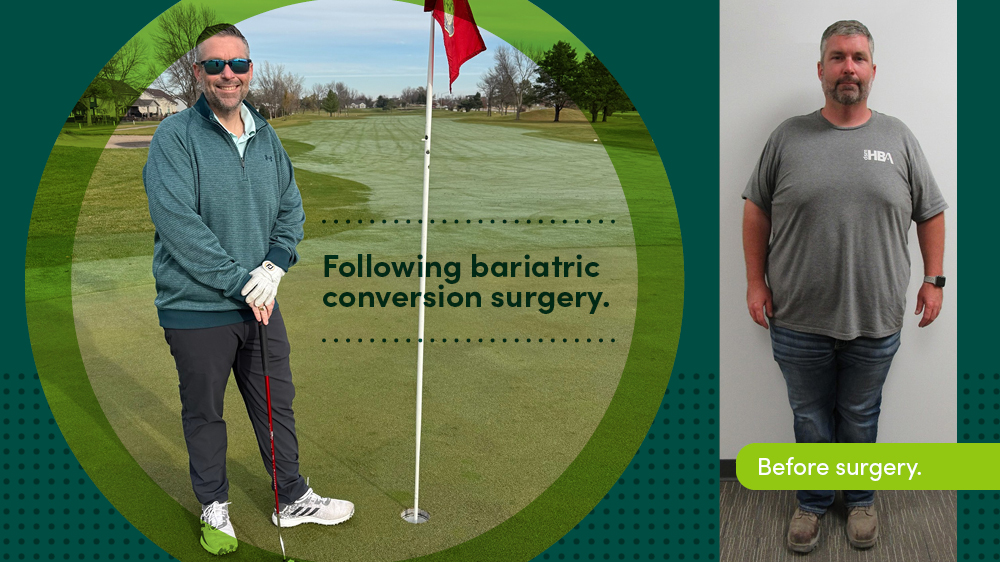Wiser and more committed after bariatric conversion surgery
October 30, 2024Categories: Bariatric Surgery Patient Stories

Learn more about MercyOne Bariatric Surgery Is bariatric surgery right for me?
Kyle Huffman lost 140 pounds after his first weight-loss surgery. It was an exciting but short-lived achievement. Slowly but surely, the scale began to creep back up.
“I lost so much weight and thought ‘Well, since my stomach was altered, I’ll be like this forever.’ I found out that’s not the case.
Eight years after surgery, Kyle’s weight had once again surpassed 300 pounds and was inching closer to his pre-surgery weight of 368 pounds. He decided to seek a second weight loss surgery, called bariatric conversion surgery, with a stronger commitment to sustain his weight loss the second time around. He wanted to be healthier and “be around a long time” for his two children, ages 7 and 9.
Kyle, 44, of Ankeny, Iowa went to the place where he had his sleeve gastrectomy in 2018, only to find the center didn’t offer conversion surgery. He checked another health system, with no success.
It wasn’t until he went to MercyOne Des Moines Bariatric Surgery that he found a program and surgeon Mark Smolik, MD offering bariatric conversion surgery.
Bariatric conversion surgery may be an option if the original bariatric procedure didn’t result in optimal weight loss, or if the patient has regained a significant amount of excess body weight. Regaining a small amount of weight is common after all bariatric surgeries.
Second time around
In February 2024, Kyle underwent Roux en Y bypass surgery – a conversion of the sleeve gastrectomy he had in 2018. This time, his pre-surgery weight was 292 pounds.
Eight months later, and still on his weight loss journey, Kyle has lost 75 pounds, with an end goal to reach 190 pounds. He especially looks forward to the day he reaches 200 pounds, a weight he’s never been in his entire adult life. As an eighth grader, he weighed 210 pounds at his football physical.
“My experience with MercyOne has been phenomenal,” Kyle said. “It felt more personal and sincere and less like a business. From my surgeon, Dr. Smolik, to the dietitians and staff at the front desk, everyone truly cares. It has been so much better than my first experience.
For a successful second weight loss surgery, MercyOne patients explore and address barriers that prevented success with their original weight loss surgery. Through these conversations, MercyOne helps patients manage their routine, strategies and nutrition plans for a new lifestyle and long-term success.
That supportive environment has given Kyle more motivation to lose weight and keep it off for a lifetime. He knows there won’t be a third weight loss surgery.
A new attitude
Kyle says he has tolerated his Roux en Y surgery better than he did his first weight loss surgery –a sleeve gastrectomy. He also is embracing this second chance with a new attitude.
“This time around, I’m putting much more effort into this. I weigh myself every day and am tracking my food. I have such a fear of gaining weight again. I just don’t want to do it. I’m in a size of jeans I can’t ever remember being in. My shirts are passing the roller coaster test – I can raise my arms without my belly hanging out. Even my feet are smaller.
Kyle is also working out more than he ever has, doing cardio, lifting weights and even running for the first time in his life. He’s more comfortable riding a bike and golfing. He became an assistant baseball coach, instead of “sitting on the sidelines in a heavy-duty extra weight lawn chair,” he said.
“I’m using the tool – a second weight loss surgery -- to help get there but I know from experience it’s not a miracle cure.
Kyle uses a baking analogy to explain. “You can use a KitchenAid® mixer or a wooden spoon to mix up cookie dough. Both do the same thing, but the electric mixer will get you there faster. Weight loss surgery helps you lose the weight faster, but you still have to work very hard to maintain that weight loss.
He says he’s glad MercyOne Des Moines Bariatric Surgery offers conversion surgery. “Statistically, I’m told the odds are against me for gaining the weight back after conversion surgery. I plan to prove people wrong. I’ve learned sustainability is key. It’s about maintaining and keeping that weight off.
